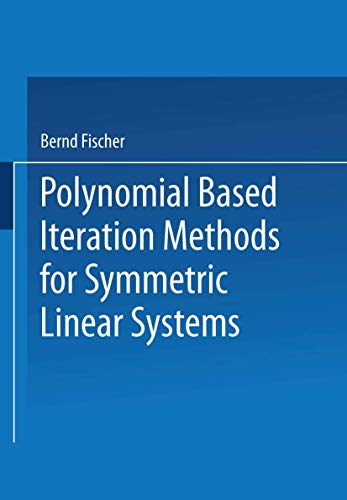Articoli correlati a Polynomial Based Iteration Methods for Symmetric Linear...

Sinossi
Any book on the solution of nonsingular systems of equations is bound to start with Ax= J, but here, A is assumed to be symmetric. These systems arise frequently in scientific computing, for example, from the discretization by finite differences or by finite elements of partial differential equations. Usually, the resulting coefficient matrix A is large, but sparse. In many cases, the need to store the matrix factors rules out the application of direct solvers, such as Gaussian elimination in which case the only alternative is to use iterative methods. A natural way to exploit the sparsity structure of A is to design iterative schemes that involve the coefficient matrix only in the form of matrix-vector products. To achieve this goal, most iterative methods generate iterates Xn by the simple rule Xn = Xo + Qn-l(A)ro, where ro = f-Axo denotes the initial residual and Qn-l is some polynomial of degree n - 1. The idea behind such polynomial based iteration methods is to choose Qn-l such that the scheme converges as fast as possible.
Le informazioni nella sezione "Riassunto" possono far riferimento a edizioni diverse di questo titolo.
Dalla quarta di copertina
Contents: Introduction - Orthogonal Polynomials - Chebyshev and Optimal Polynomials - Orthogonal Polynomials and Krylow Subspaces - Estimating the Spectrum and the Distribution function - Parameter Free Methods - Parameter Dependent Methods - The Stokes Problem - Approximating the A-Norm - Bibliography - Notation - Index
Le informazioni nella sezione "Su questo libro" possono far riferimento a edizioni diverse di questo titolo.
EUR 2,25 per la spedizione in U.S.A.
Destinazione, tempi e costiCompra nuovo
Visualizza questo articoloEUR 2,25 per la spedizione in U.S.A.
Destinazione, tempi e costiRisultati della ricerca per Polynomial Based Iteration Methods for Symmetric Linear...
Polynomial Based Iteration Methods for Symmetric Linear Systems -Language: german
Da: GreatBookPrices, Columbia, MD, U.S.A.
Condizione: New. Codice articolo 20348009-n
Quantità: 15 disponibili
Polynomial Based Iteration Methods for Symmetric Linear Systems (German Edition)
Da: Lucky's Textbooks, Dallas, TX, U.S.A.
Condizione: New. Codice articolo ABLIING23Mar3113020322117
Quantità: Più di 20 disponibili
Polynomial Based Iteration Methods for Symmetric Linear Systems (Paperback)
Da: Grand Eagle Retail, Mason, OH, U.S.A.
Paperback. Condizione: new. Paperback. Any book on the solution of nonsingular systems of equations is bound to start with Ax= J, but here, A is assumed to be symmetric. These systems arise frequently in scientific computing, for example, from the discretization by finite differences or by finite elements of partial differential equations. Usually, the resulting coefficient matrix A is large, but sparse. In many cases, the need to store the matrix factors rules out the application of direct solvers, such as Gaussian elimination in which case the only alternative is to use iterative methods. A natural way to exploit the sparsity structure of A is to design iterative schemes that involve the coefficient matrix only in the form of matrix-vector products. To achieve this goal, most iterative methods generate iterates Xn by the simple rule Xn = Xo + Qn-l(A)ro, where ro = f-Axo denotes the initial residual and Qn-l is some polynomial of degree n - 1. The idea behind such polynomial based iteration methods is to choose Qn-l such that the scheme converges as fast as possible. Any book on the solution of nonsingular systems of equations is bound to start with Ax= J, but here, A is assumed to be symmetric. These systems arise frequently in scientific computing, for example, from the discretization by finite differences or by finite elements of partial differential equations. Usually, the resulting coefficient matrix A is large, but sparse. In many cases, the need to store the matrix factors rules out the application of direct solvers, such as Gaussian elimination in which case the only alternative is to use iterative methods. A natural way to exploit the sparsity structure of A is to design iterative schemes that involve the coefficient matrix only in the form of matrix-vector products. To achieve this goal, most iterative methods generate iterates Xn by the simple rule Xn = Xo + Qn-l(A)ro, where ro = f-Axo denotes the initial residual and Qn-l is some polynomial of degree n - 1. The idea behind such polynomial based iteration methods is to choose Qn-l such that the scheme converges as fast as possible. Shipping may be from multiple locations in the US or from the UK, depending on stock availability. Codice articolo 9783663111092
Quantità: 1 disponibili
Polynomial Based Iteration Methods for Symmetric Linear Systems (German Edition)
Da: Best Price, Torrance, CA, U.S.A.
Condizione: New. SUPER FAST SHIPPING. Codice articolo 9783663111092
Quantità: 2 disponibili
Polynomial Based Iteration Methods for Symmetric Linear Systems -Language: german
Da: GreatBookPrices, Columbia, MD, U.S.A.
Condizione: As New. Unread book in perfect condition. Codice articolo 20348009
Quantità: 15 disponibili
Polynomial Based Iteration Methods for Symmetric Linear Systems (German Edition)
Da: California Books, Miami, FL, U.S.A.
Condizione: New. Codice articolo I-9783663111092
Quantità: Più di 20 disponibili
Polynomial Based Iteration Methods for Symmetric Linear Systems (German Edition)
Da: Ria Christie Collections, Uxbridge, Regno Unito
Condizione: New. In. Codice articolo ria9783663111092_new
Quantità: Più di 20 disponibili
Polynomial Based Iteration Methods for Symmetric Linear Systems
Da: Chiron Media, Wallingford, Regno Unito
Paperback. Condizione: New. Codice articolo 6666-IUK-9783663111092
Quantità: 10 disponibili
Polynomial Based Iteration Methods for Symmetric Linear Systems
Da: BuchWeltWeit Ludwig Meier e.K., Bergisch Gladbach, Germania
Taschenbuch. Condizione: Neu. This item is printed on demand - it takes 3-4 days longer - Neuware -Contents: Introduction - Orthogonal Polynomials - Chebyshev and Optimal Polynomials - Orthogonal Polynomials and Krylow Subspaces - Estimating the Spectrum and the Distribution function - Parameter Free Methods - Parameter Dependent Methods - The Stokes Problem - Approximating the A-Norm - Bibliography - Notation - Index 284 pp. Deutsch. Codice articolo 9783663111092
Quantità: 2 disponibili
Polynomial Based Iteration Methods for Symmetric Linear Systems
Da: Books Puddle, New York, NY, U.S.A.
Condizione: New. pp. 284 Index. Codice articolo 26142298285
Quantità: 4 disponibili

